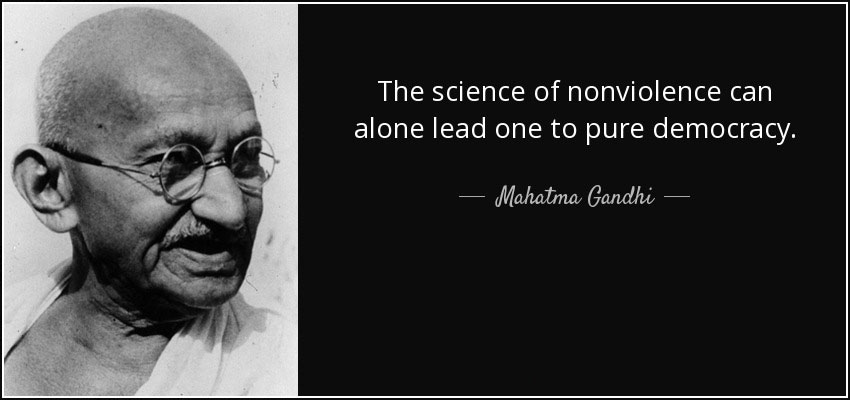In this 8-minute TedX Talk from within Graterford State Prison, we get to turn the spotlight on the science of nonviolence through the power of rehumanization. Reflection: In what ways have your experiences shaped your views on the prison system in your country, and what is one thing you learned from Anthony Wyatt’s talk? … read more
The Science of Nonviolence
What science tells us today about human nature is thoroughly compatible with the worldview we have articulated. There is no conflict whatever between the methodology and findings of science and the higher image of the human being in which nonviolence is a defining potential. Science at its best entails a rigorous approach to observation and the testing of hypotheses. The science of nonviolence is no exception. While science in the West has been practiced as mainly an observation of the outside world, the science of nonviolence must embrace an internal component as well. Gandhi, for whom nonviolence was entirely a science, was thoroughly convinced that there are laws of spiritual behavior just as rigorous, reliable and predictable as the laws that govern the material world. On this page you will find some of the latest findings of many relevant fields of science.The Science of Nonviolence – podcast

Did you know that Nonviolence is a science? This week the theme of our show is science. In this episode of Nonviolence Radio, Stephanie Van Hook challenges Michael Nagler in a game to find the science behind Nonviolent principles. They discuss, at length, neuroscience, social science, evolution, behavioral science and more! In the second… read more
Seeing Nonviolence?

The Metta Center–especially our founder, Michael Nagler–has been interested in the science of nonviolence for several decades. So the other day, I sent this article out to our awesome volunteers to see if it would spark some cool insights about how we understand nonviolence: Hi everyone, The Metta Team has started exploring questions related to… read more
“Returning Home to Ourselves”–Daily Metta
April 12 “The world today is moving towards the ideal of collective or co-operative effort in every department of life.” -Gandhi (Harijan, 2-5-1942, p. 39) Through her study of the microbial universe, evolution biologist and futurist Elisabet Sahtouris can speak to the human condition from a rather penetrating angle. Life, she maintains, has been discovering… read more
Nonviolence and the New Story: Daring to Explore the World Within Webinar
This webinar features a presentation and conversation with Professor Michael Nagler on “Nonviolence and the New Story: Daring to Explore the World Within,” which was originally given as a TEDx talk in Fremont, CA. The 30-minute presentation is followed by Q&A with participants in the Metta Center Certificate in Nonviolence Studies program (total running time 1:03).… read more
The Nonviolent Principles of Nature
[FROM CAL PEACE POWER MAGAZINE: VOLUME 3, ISSUE 1, SPRING 2007) The Nonviolent Principles of Nature By Scott Riley Printable Version: Download as PDF Click to Enlarge The dominant human culture is currently organized around a “realist” worldview. This paradigm describes the universe as a collection of disconnected entities that share nothing intrinsically in common.… read more
Feeding our minds nourishing media- Francis Moore Lappe
We have been recommending to people who want to dedicate themselves to finding nonviolent solutions to begin by boycotting the mass media. We say this because we believe what we put into our minds matters. Images that degrade the human image and suggest that fulfillment comes from corporate capitalist consumption occupy the airwaves, billboards and… read more
Moral behavior in animals–Frans de Waal
At the Metta Center one of our favorite scientists is, without a doubt, Prof. Frans de Waal. In the short video in this post, he offers some preliminary evidence to make the case for “morality from below,” that is, human beings have not “invented” justice, fairness, cooperation and forgiveness as ideas and concepts, rather, they… read more







